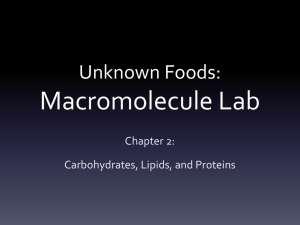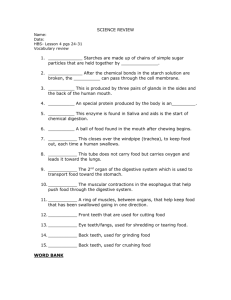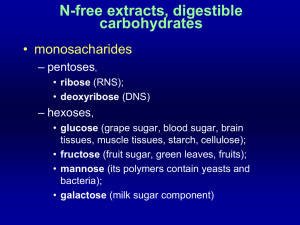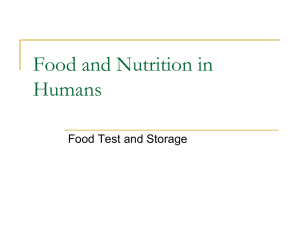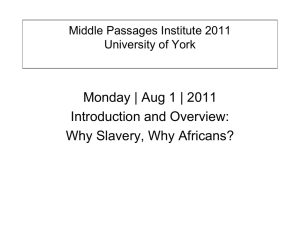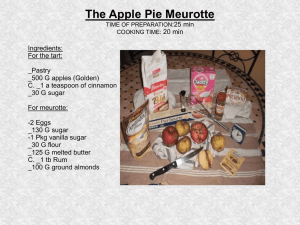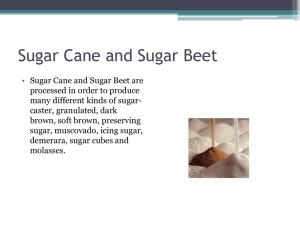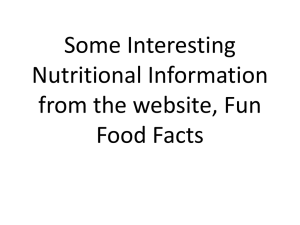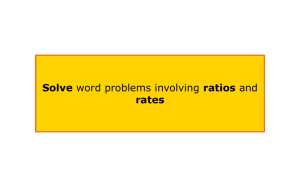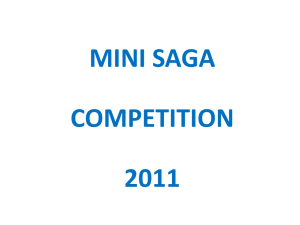FUNCTIONS OF INGREDIENTS LESSON 1
advertisement
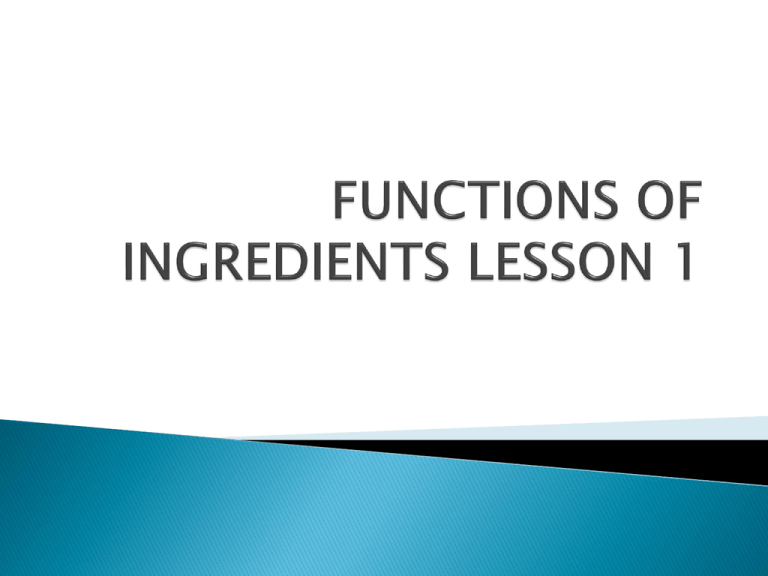
Lesson 14 Manufacturing quality and CAD/CAM Lesson 23 Labelling and packaging Lesson 24 SECE Lesson 15 Equipment Lesson 22 Acids, alkaline and additives Lesson 25 Technological Developments - NANO Lesson 3 Dips Lesson 10 Research Techniques Lesson 16 PRACTICAL Cultural breads Lesson 21 Combining ingredients and structures Lesson 26 & 27 PRACTICE EXAM Lesson 4 & 5 Safe storage Lesson 8 & 9 Design exam Questions Lesson 17 Prototypes and sensory testing Lesson 20 PRACTICAL Pastry twist development Lesson 6 Standard components Lesson 7 PRACTICAL Bread sticks Lesson 18 Nutrition and healthy Eating Lesson 19 Nutrition and healthy Eating Lesson 1 Dips Lesson 2 PRACTICAL Dips Lesson 13 PRACTICAL Bread and share Lesson 11 & 12 Functions of foods BIG PICTURE OF EXAM PREP SHEET LESSONS To know the functional properties of starch, sugar, protein and fat To examine the use of starch, sugar, protein and fat within products To be able to recall the functional properties of sugar, protein and fat and starch What starchy foods can you name? Found in bread, pasta, rice, potatoes, pulses and breakfast cereals. They keep our blood sugar levels constant. Starch is a polysaccharide made up for glucose units. We call this a carbohydrate. Carbohydrates help fill is up so we are less likely to crave for high fat snacks. Our DRV (Dietary )reference Value for starch is 39% of our energy. What does this mean we should be eating? Can you think of examples of products that would help provide this? Lets break this down into high levels and low levels White bread Wholemeal bread Beans Lentils White flour Cornflakes White pasta Wholemeal pasta Weetabix Modified starch has the WOW factor for manufacturers in the food industry. Can be used to thicken a custard instantly. Thicken low calorie salad dressings. Have you ever made angel delight packet mix at home? It thickens instantly! Who is going to give us a dem on the use of modified starch in angel delight? Look at the packet who can spot the ingredient modified starch? Gelatinization – say this 3 times now say it to someone else. It means the process for thickening e.g soups and sauces. How does it work? The starch is heated in a liquid it makes the starch granuels swollen and burst which thickens the liquid. (Think of a white sauce) Have you ever made a lumpy, flour tasting sauce before – yuk Gelatinization did not take place Properly so you need correct amount of liquid and temp. Type of starch How it can be used Result Wheat flour Creamy Sauce Arrow root Clear transparent sauce Cornflour Gives a less clear opaque gel can set moulds e.g blancmange and trifles. Type of starch How it can be used Result Wheat flour With butter and milk to make a white sauce Creamy Sauce Arrow root Blended with water or fruit juice to make a fruit glaze Clear transparent sauce Cornflour As a thick custard for a trifle. The thickened liquid sets and forms a gel. Gives a less clear opaque gel can set moulds e.g blancmange and trifles. Who can tell me why we need to watch our fat Intake? Butter contains 80% fat. Too much fat in the diet leads to obesity and high levels of cholesterol which contributes to Corononary hear disease. Butter is a SATURATED fat Sunflower Olive Soya bean Ghee Butter Peanut oil Dripping Suet Lard Function Frying Enriching Shortening Emulsifying Moistening Colouring Creaming/aerates Flavour Seals Extends shelf life Product Function Product Frying Chips Enriching Sauces Shortening Pastry Emulsifying Mayoniase Moistening Buttered on bread/scones Colouring Butter in pastry Creaming/aerates Cakes Flavour Fat in biscuits Seals Preserves pate Extends shelf life Cakes to make last longer When you make mayonnaise the oil and water would separate. Oil on the top and water underneath. To stop this happening and emulsifier is used so they mix together. In mayonnaise it is egg yolk (LECITHIN) which does this job. Who adds sugar to tea/coffee/breakfast cereals? Why do we do this? Which do you add? Granulated – sweetens tea/breakfast cereals Caster sugar – finer used in biscuit making Icing sugar – used for icings Brown sugar – stronger flavour for gingerbread and melting mixtures. Sugar is made from sugar beet or cane. The beet or can is crushed and mixed with water and then the liquid is boiled to make sugar crystals. biscuits – sweetness, colour, texture, volume Jam – preservative, sets the fruit, texture Cooked fruit – sweeten help keep the shape Bread- speeds fermentation – food for yeast Cakes – sugar helps the fat to lighten Baked beans/canned veg – to help the flavour Look at the list are there any you are surprised about? Key ones to remember – used to sweeten drinks and products. Sorbitol Mannitol Hydrogenated Glucose syrup Saccharine Aspartame Which is which DEXTRINISATION CARAMELISATION Sugar is heated to a high temperature, it thickens and turns brown to give that desired flavour which is................................. When bread is grilled the starch turns to a simple sugar called ................................. Eggs is one of the main sources of protein that is useful in cooking. Eggs in cake making/ AERATION- what does this mean to you? COAGULATION EMULSIFICATION Whisking the egg............. stretches the protein and makes air bubbles which creates a foam. This foam keeps stable because all of your whisking has made heat and partially coagulated it. Can you remember writing your name in the foam? Think of your quiche setting. (Coagulation) Eggs set when heated. Eggs are used to thicken, bind and coat. Have you made fish cakes or coated fish with egg to form a coat for your breadcrumbs? TEMPERATURE CHECK Egg yolk protein coagulates at 70c Egg white protein coagulates at 60c Garnish salad Glaze on scones/pastries Coagulation /lemon meringue, egg custard Emulsify salad dressings Aeration in meringues, swiss rolls, mousse Split into 4 groups. Each table will be an expert on either Sugar Fat Protein Starch Each table to give a review and share with group.
